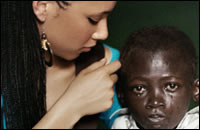Aids Not killing Hope in Africa

 |
| Star Singer Alicia Keys with Sudi, a South African boy who died of AIDS shortly after they had met. |
It's amazing to think that all this has happened since I was a child and that myself and people younger than me have never lived in a world without this devastating disease looming over us.
I spent my childhood in Manhattan where I was exposed to the consequences of AIDS at an early age. I remember a friend of my mother's who used to visit us in the evenings.
He always seemed healthy and strong; but over time, I noticed he grew weaker and didn't understand why. Then he stopped visiting completely. My mother did not delve into the difficult subject, but I later learned that he had died of AIDS. I was about 7 years old.
In 2001, after I began my professional musical career, I met a remarkable woman named Leigh Blake, a mother and a fighter on the front lines of the battle against AIDS. Leigh opened my eyes to the extent of the devastation AIDS had caused in Africa and to the pressing needs of the continent's people.
She had a vision to offer the American public -- the chance to pay for AIDS treatment and care for poor Africans who would die without it. It seemed impossible, but Leigh is so passionate that I decided that if she could figure out how to do it I would be with her all the way. When she offered to take me on a tour of AIDS treatment facilities in South Africa I jumped at the opportunity.
The next year, my first visit to Africa completely changed my world view. I came to understand that AIDS was not simply a deadly disease but a force capable of orphaning children, uprooting communities and stifling economic progress.
What AIDS could not do was suffocate the hope of the remarkable people I met throughout Africa. If people who had suffered such unthinkable devastation could maintain hope, then I could certainly hope for an end to this pandemic in my lifetime.
With this goal in mind, Leigh and I started Keep A Child Alive in 2003 and our clinic and orphan sites operate in six countries, supporting approximately 45,000 children and their families who have been victimized by AIDS
I've had the privilege of meeting many brave children, women and men affected by HIV and AIDS. One of the most touching to me personally is that of Sudi, whom I met in South Africa in 2006. Though he was 13 years old, when I met him he looked only 8 or 9. This is the stark effect that AIDS had taken on his body. He'd stopped growing and was fragile and weak.
Sudi wanted to go to school but his teachers said that he was too sick to attend. Though he'd been taking the antiretroviral drugs common in the U.S. and elsewhere, they came too late. Sudi died only a few days after I met him. His case and others show how critical it is that we come together to provide these drugs for children because 50 percent of them will die before the age of 2, unnecessarily, according to the UN's 2004 report on the global aids epidemic.
If millions of Americans died every year from polio or the flu, we'd be shocked and appalled because polio is preventable and the flu is treatable. With the proper attention, HIV is both preventable and treatable, yet millions of Africans die needlessly of the virus every year. We wouldn't consider this acceptable in the U.S. so why would we stand for it anywhere else?
What hurts me most are three words that should never be allowed to go together, have now become commonplace in Africa: child-headed households. Children orphaned by AIDS claiming the lives of their parents are often forced into crime, or sexual exploitation, or enrolled as child soldiers to fend for their families. This is unacceptable to me and very painful.
The truth is we wouldn't, and through globalization and awareness that comes from our increased interconnectivity online and off, more and more of us are taking a stand against this injustice. We realize that this disease does not discriminate between national borders, and neither should the cure.
We must never give up until AIDS treatment and realistic prevention measures go hand-in-hand and become equally accessible worldwide; until we realize that keeping mothers alive and empowering them is critical to the well-being of the world's children; and until we stand together and say, "We did not sit idly by and watch an entire continent perish."
Helping keep a child, or mother, or father, or brother or sister alive means turning the worst epidemic of our lifetime into the greatest victory of our generation.
Excerpted from "Alicia in Africa", a documentary on her work in Africa, premieres July 4. She submitted this commentary to CNN's "Larry King Live."
